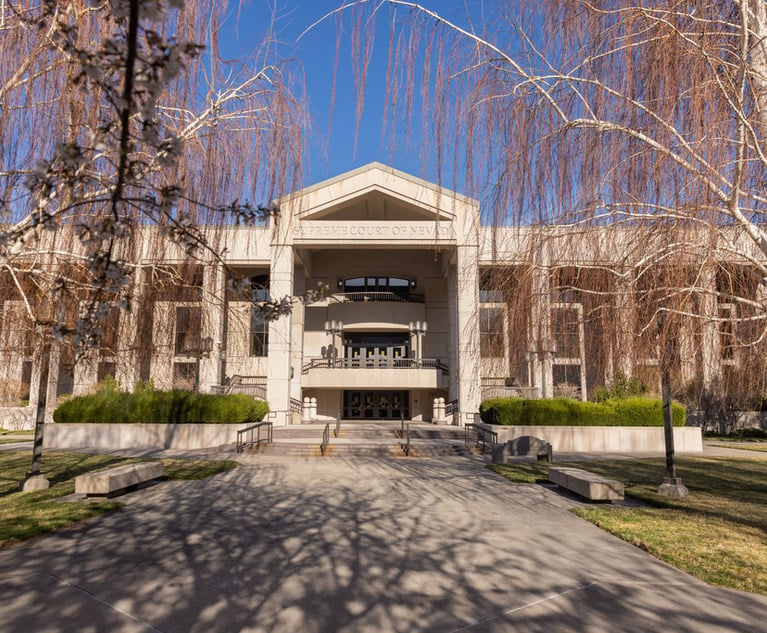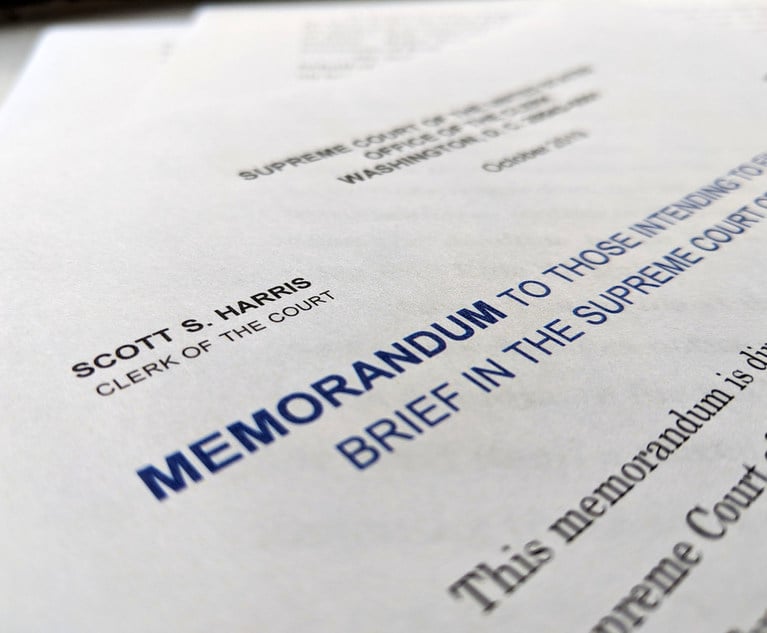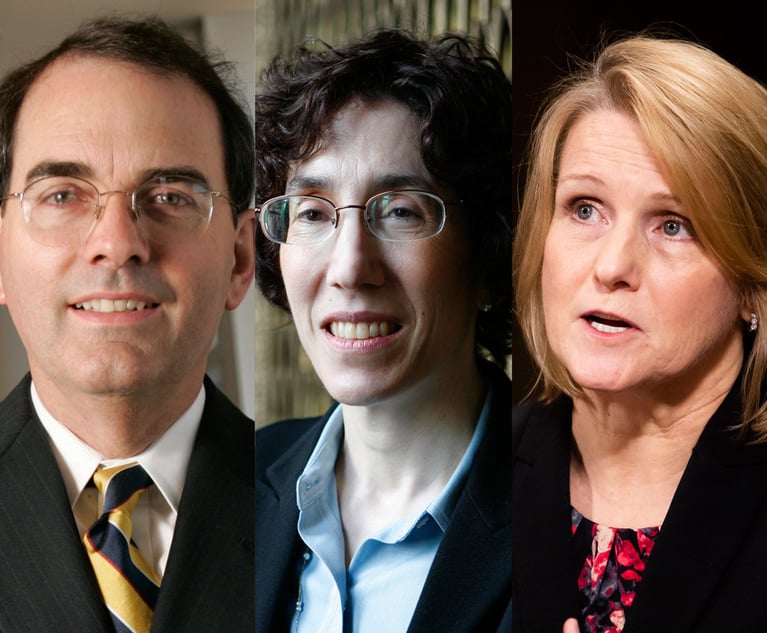 George Hutchinson, with Finnegan, Henderson, Farabow, Garrett & Dunner in Washington, D.C., Feb. 22, 2019. Credit: Diego M. Radzinschi / NLJ
George Hutchinson, with Finnegan, Henderson, Farabow, Garrett & Dunner in Washington, D.C., Feb. 22, 2019. Credit: Diego M. Radzinschi / NLJSupreme Court's Last 'Crier' Has Stories to Tell About Long-Gone Justices
Unlike many court traditions, the crier no longer exists. Meet George Hutchinson, the last crier of the court, who served in that role from 1952 to 1962.
March 05, 2019 at 03:09 PM
6 minute read
When the U.S. Supreme Court met for the first time on Feb. 1, 1790, one of its first orders of business was to hire a crier, someone who could herald the opening of its session the next day.
Unlike many court traditions, the crier no longer exists, which is why you may not have known there ever was one. George Hutchinson, the last crier of the court, served in that role from 1952 to 1962. From then on, the court's marshal has taken on the singular task of shouting “Oyez Oyez Oyez” among other welcoming words, and gaveling the court to order.
Last December, Chief Justice John Roberts Jr. invited Hutchinson, who is 95 now, to the court to be recognized for his decades of service. Here is what Roberts said in open court:
“We are very pleased to have visiting with us this morning Mr. George E. Hutchinson, who this year celebrates eight decades of connection to the Court. In 1938, he started work here as a page. Charles Evans Hughes was sitting here at that time. Mr. Hutchinson was later Assistant Marshal and became the last person to hold the title of 'Court Crier.' In that role he participated in many historic moments. To cite just one example, he cried the Court for both arguments in Brown v. Board of Education and was here for the announcement of the decision. He remains a member in good standing of our bar. Mr. Hutchinson, welcome back!”
It was a memorable capstone to a long life in the law, and came as something of a surprise to Hutchinson. He knew something was up when he was invited to attend the court session that day, but he was not expecting to be featured in a pronouncement from the chief justice.
“It was very nice. He was so cordial. I felt at home,” Hutchinson said in an interview last month.
Hutchinson is an exuberant man, full of anecdotes that go back to the days when the court building, completed in 1935, was brand new. Asked the inevitable question for his formula for living so long, Hutchinson said, “Have fun! Smile!”
Except for a tour of duty in Europe during World War II, Hutchinson worked at the high court from 1938 until 1962, when he left to take a position as marshal, then clerk, at the U.S. Court of Customs and Patent Appeals, the precursor to the Federal Circuit, where he served as its first clerk in 1983. Along the way, he earned a law degree at George Washington University, and became a member of the Supreme Court bar. He then went into private practice at Finnegan, Henderson, Farabow, Garrett & Dunner, where he still has an office and parking space as “of counsel” to the firm.
What follows are some of Hutchinson's memories, edited for length and clarity:
>> “I was handed the 'call' when I took the job, and they tested me. It was a handwritten call. [The marshal] said, 'This is it. Keep it in front of you, use it every day.' It was on beat-up paper. And the gavel wasn't a whole gavel. There was no handle. All it was was the clonk. I said, 'Where's the handle?' They said, 'This is tradition. You've got to use this.' So for 10 years I was banging like this.”
>> “Thurgood Marshall was our regular customer for a couple years, but he was so nice. We handled all court sessions, meaning we had to provide every [arguing] attorney with 10 seats. So we have to take charge of that. He didn't ask for extra seats. He got 10 seats. He said, 'That's fine. I can live with that.' Not so for the others.”
>> “Felix Frankfurter would call up for odd things. I witnessed his will. He had a corner office, East Capitol and 2nd, a wonderful suite of offices. One day I got a call from Elsie Douglas, Frankfurter's secretary, and she said, 'Come around, the justice wants to see you.' Hmm. I walked in and there he is. He said, 'Have you ever faced death?' I said, 'What?' I had to think about it. 'I was in the service in World War II.' He laughed, he said, 'Here,' and he threw me his will. Next Dick Goodwin [Frankfurter's law clerk in 1958] came in and we both signed it together.”
>> “In the 1950s, there were a lot of cases coming up to the court involving censorship, especially because tapes, movies, whatever would come and would have to be seen by a customs official. So there was one case, sorry, I don't remember the name, but the court received a petition and they granted it. They said, 'We're going to have to see that film.' So Chief Justice [Earl] Warren called up the marshal's office and said, 'I want that tape shown in the east conference room and I don't want anybody else in it except the court.' I said, 'That's fine.' It was set up. All the justices marched in. I was outside the room the whole time just to make sure nobody went in. It was crazy.”
>> “You knew who the baseball people were. Warren was really a baseball fan. Potter Stewart was another one. He was the one that was nearest to my desk. In the Pirate-Yankees seventh game of the [1960] World Series, Bill Mazeroski hit the home run, and the final score was 10 to 9. Before the game Stewart said, 'Why don't you give me inning by inning scores?' There was a radio in the marshal's office. And all I'd have to do is send a page to the marshal's office to get the score. By the fifth inning Stewart said, 'Why don't you send me half inning scores?' Which I did. When Mazeroski hit the home run, his eyes lit up and he sent the note down to the court.”
This content has been archived. It is available through our partners, LexisNexis® and Bloomberg Law.
To view this content, please continue to their sites.
Not a Lexis Subscriber?
Subscribe Now
Not a Bloomberg Law Subscriber?
Subscribe Now
NOT FOR REPRINT
© 2024 ALM Global, LLC, All Rights Reserved. Request academic re-use from www.copyright.com. All other uses, submit a request to [email protected]. For more information visit Asset & Logo Licensing.
You Might Like
View All
Divided 5th Circuit Shoots Down Nasdaq Diversity Rules

Nevada Supreme Court to Decide Fate of Groundbreaking Contingency Cap Ballot Measure
5 minute read
Lawyers, Law Groups Oppose Proposal to Require Court Approval for Amicus Briefs

9th Circuit Judges Weigh if Section 230 Shields Grindr From Defective Design Claims
Trending Stories
- 1Senate Confirms Last 2 of Biden's California Judicial Nominees
- 2Morrison & Foerster Doles Out Year-End and Special Bonuses, Raises Base Compensation for Associates
- 3Tom Girardi to Surrender to Federal Authorities on Jan. 7
- 4Husch Blackwell, Foley Among Law Firms Opening Southeast Offices This Year
- 5In Lawsuit, Ex-Google Employee Says Company’s Layoffs Targeted Parents and Others on Leave
Who Got The Work
Michael G. Bongiorno, Andrew Scott Dulberg and Elizabeth E. Driscoll from Wilmer Cutler Pickering Hale and Dorr have stepped in to represent Symbotic Inc., an A.I.-enabled technology platform that focuses on increasing supply chain efficiency, and other defendants in a pending shareholder derivative lawsuit. The case, filed Oct. 2 in Massachusetts District Court by the Brown Law Firm on behalf of Stephen Austen, accuses certain officers and directors of misleading investors in regard to Symbotic's potential for margin growth by failing to disclose that the company was not equipped to timely deploy its systems or manage expenses through project delays. The case, assigned to U.S. District Judge Nathaniel M. Gorton, is 1:24-cv-12522, Austen v. Cohen et al.
Who Got The Work
Edmund Polubinski and Marie Killmond of Davis Polk & Wardwell have entered appearances for data platform software development company MongoDB and other defendants in a pending shareholder derivative lawsuit. The action, filed Oct. 7 in New York Southern District Court by the Brown Law Firm, accuses the company's directors and/or officers of falsely expressing confidence in the company’s restructuring of its sales incentive plan and downplaying the severity of decreases in its upfront commitments. The case is 1:24-cv-07594, Roy v. Ittycheria et al.
Who Got The Work
Amy O. Bruchs and Kurt F. Ellison of Michael Best & Friedrich have entered appearances for Epic Systems Corp. in a pending employment discrimination lawsuit. The suit was filed Sept. 7 in Wisconsin Western District Court by Levine Eisberner LLC and Siri & Glimstad on behalf of a project manager who claims that he was wrongfully terminated after applying for a religious exemption to the defendant's COVID-19 vaccine mandate. The case, assigned to U.S. Magistrate Judge Anita Marie Boor, is 3:24-cv-00630, Secker, Nathan v. Epic Systems Corporation.
Who Got The Work
David X. Sullivan, Thomas J. Finn and Gregory A. Hall from McCarter & English have entered appearances for Sunrun Installation Services in a pending civil rights lawsuit. The complaint was filed Sept. 4 in Connecticut District Court by attorney Robert M. Berke on behalf of former employee George Edward Steins, who was arrested and charged with employing an unregistered home improvement salesperson. The complaint alleges that had Sunrun informed the Connecticut Department of Consumer Protection that the plaintiff's employment had ended in 2017 and that he no longer held Sunrun's home improvement contractor license, he would not have been hit with charges, which were dismissed in May 2024. The case, assigned to U.S. District Judge Jeffrey A. Meyer, is 3:24-cv-01423, Steins v. Sunrun, Inc. et al.
Who Got The Work
Greenberg Traurig shareholder Joshua L. Raskin has entered an appearance for boohoo.com UK Ltd. in a pending patent infringement lawsuit. The suit, filed Sept. 3 in Texas Eastern District Court by Rozier Hardt McDonough on behalf of Alto Dynamics, asserts five patents related to an online shopping platform. The case, assigned to U.S. District Judge Rodney Gilstrap, is 2:24-cv-00719, Alto Dynamics, LLC v. boohoo.com UK Limited.
Featured Firms
Law Offices of Gary Martin Hays & Associates, P.C.
(470) 294-1674
Law Offices of Mark E. Salomone
(857) 444-6468
Smith & Hassler
(713) 739-1250










